
Risk factors for heel spurs
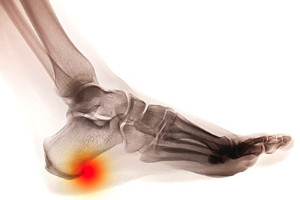 Heel spurs are one of several conditions that can cause heel pain in the feet. A heel spur is an outgrowth of the heel bone that is pointed. Heel spurs can develop at the back of the heel, under the heel, or beneath the sole of the foot. The growths themselves are a result of calcium deposits that develop over a few months. Risk factors for the condition include walking gait abnormalities, running or jogging, poorly fitted shoes lacking support, being overweight, old age, diabetes, standing for long periods of time, frequent short bursts of physical activity, and having either flat feet or high arches.
Heel spurs are one of several conditions that can cause heel pain in the feet. A heel spur is an outgrowth of the heel bone that is pointed. Heel spurs can develop at the back of the heel, under the heel, or beneath the sole of the foot. The growths themselves are a result of calcium deposits that develop over a few months. Risk factors for the condition include walking gait abnormalities, running or jogging, poorly fitted shoes lacking support, being overweight, old age, diabetes, standing for long periods of time, frequent short bursts of physical activity, and having either flat feet or high arches.
Heel spurs can be incredibly painful and sometimes may make you unable to participate in physical activities. To get medical care for your heel spurs, contact Dr. Mark Gagnon from Advanced Podiatry. Our doctor will do everything possible to treat your condition.
Heels Spurs
Heel spurs are formed by calcium deposits on the back of the foot where the heel is. This can also be caused by small fragments of bone breaking off one section of the foot, attaching onto the back of the foot. Heel spurs can also be bone growth on the back of the foot and may grow in the direction of the arch of the foot.
Older individuals usually suffer from heel spurs and pain sometimes intensifies with age. One of the main condition's spurs are related to is plantar fasciitis.
Pain
The pain associated with spurs is often because of weight placed on the feet. When someone is walking, their entire weight is concentrated on the feet. Bone spurs then have the tendency to affect other bones and tissues around the foot. As the pain continues, the feet will become tender and sensitive over time.
Treatments
There are many ways to treat heel spurs. If one is suffering from heel spurs in conjunction with pain, there are several methods for healing. Medication, surgery, and herbal care are some options.
If you have any questions feel free to contact one of our offices located in Crestwood, Orland Park, and Summit, IL . We offer the latest in diagnostic and treatment technology to meet your needs.
Pay attention to your shoes
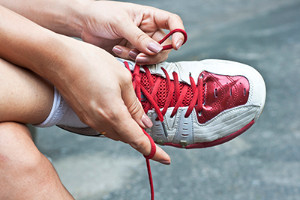 Whether or not your shoes fit properly could be the difference between having healthy feet and having to walk around in pain. There are around 100 different working parts in your feet with 25% of all the bones of your skeleton residing inside your slippers. That being said, it is no wonder that wearing good quality, well-fitted shoes is extremely important for good foot and overall health. There are a few tips to follow when you are shoe-shopping: make sure to get your feet measured (they change size over time!), walk around the shoe store a bit with your new pair on, and buy activity appropriate footwear. This last point is especially important for running. Just because you’re not jogging in high heels doesn’t mean you’re wearing the right shoes.
Whether or not your shoes fit properly could be the difference between having healthy feet and having to walk around in pain. There are around 100 different working parts in your feet with 25% of all the bones of your skeleton residing inside your slippers. That being said, it is no wonder that wearing good quality, well-fitted shoes is extremely important for good foot and overall health. There are a few tips to follow when you are shoe-shopping: make sure to get your feet measured (they change size over time!), walk around the shoe store a bit with your new pair on, and buy activity appropriate footwear. This last point is especially important for running. Just because you’re not jogging in high heels doesn’t mean you’re wearing the right shoes.
Finding a properly-fitting shoe is important in reducing injuries and preventing foot problems. For more information about treatment, contact Dr. Mark Gagnon from Advanced Podiatry. Our doctor will treat your foot and ankle needs.
Proper Shoe Fitting
A common concern when it comes to foot health, having properly fitted shoes can help prevent injuries to the foot. Out feet affect our posture and gait, which in turn affects the biomechanics and overall bodily structure. With 33 joints, 26 bones, and over 100 ligaments, the potential for serious injury is much greater than one realizes. Although the feet cease growth in adulthood, they still change shape as they mature. Here are some factors to consider when it comes to investing in proper fitting shoes:
- Be sure the shoes fit correctly right away
- Ensure the ball of your foot fits comfortably in the widest portion of the shoes
- Even though they may look fashionable, improper fitting shoes can either create adverse conditions or exacerbate existing ones you may already have
- Walk along a carpeted surface to ensure the shoes comfortably fit during normal activity
Keeping in mind how shoes fit the biomechanics of your body, properly-fitting shoes are vitally important. Fortunately, it is not difficult to acquire footwear that fits correctly. Be sure to wear shoes that support the overall structure of your body. Do your feet a favor and invest in several pairs of well-fitted shoes today.
If you have any questions please feel free to contact one of our offices located in Crestwood, Orland Park, and Summit, IL . We offer the newest diagnostic and treatment technologies for all your foot and ankle needs.
Taking Care of Your Feet on Vacation
 Traveling can be exciting, but nothing can ruin a trip like foot pain. And that’s not all that you need to watch out for when jet setting. Sitting in a small airplane seat, especially on a long flight, can lead to cramping and discomfort. In order to avoid this, try to walk the aisles as much as you can and stretch frequently. Drinking plenty of water and doing your best to avoid alcohol is also a good tip to avoid the aches and pains of a flight. When you land, there’s a good chance that you’ll be doing some walking. Be sure to wear comfortable shoes to avoid blisters and swelling. Remember, you can’t take a vacation from your feet.
Traveling can be exciting, but nothing can ruin a trip like foot pain. And that’s not all that you need to watch out for when jet setting. Sitting in a small airplane seat, especially on a long flight, can lead to cramping and discomfort. In order to avoid this, try to walk the aisles as much as you can and stretch frequently. Drinking plenty of water and doing your best to avoid alcohol is also a good tip to avoid the aches and pains of a flight. When you land, there’s a good chance that you’ll be doing some walking. Be sure to wear comfortable shoes to avoid blisters and swelling. Remember, you can’t take a vacation from your feet.
Everyday foot care is very important to prevent infection and other foot ailments. If you need your feet checked, contact Dr. Mark Gagnon from Advanced Podiatry. Our doctor can provide the care you need to keep you pain-free and on your feet.
Everyday Foot Care
Often, people take care of their bodies, face and hair more so than they do for their feet. But the feet are a very important aspect of our bodies, and one that we should pay more attention to. Without our feet, we would not be able to perform most daily tasks.
It is best to check your feet regularly to make sure there are no new bruises or cuts that you may not have noticed before. For dry feet, moisturizer can easily be a remedy and can be applied as often as necessary to the affected areas. Wearing shoes that fit well can also help you maintain good foot health, as well as making it easier to walk and do daily activities without the stress or pain of ill-fitting shoes, high heels, or even flip flops. Wearing clean socks with closed shoes is important to ensure that sweat and bacteria do not accumulate within the shoe. Clean socks help to prevent Athlete’s foot, fungi problems, bad odors, and can absorb sweat.
If you have any questions please feel free to contact one of our offices located in Crestwood, Orland Park, and Summit, IL . We offer the newest diagnostic and treatment technologies for all your foot and ankle needs.
What is Morton’s Neuroma?
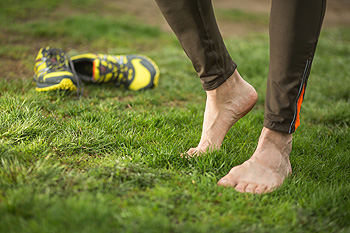 Morton’s neuroma, caused by a thickening of tissue around the nerves in your toes, usually happens between the third and fourth toes, causing a feeling like something is stuck in your sock. Your foot, which has more than 100 muscles, 26 bones, and 33 joints, is a very complex structure, which is why foot pain can be so common. Morton’s neuroma is often treated fairly simply, by things like foot and arch supports, anti-inflammatories, orthotics, and physical therapy. It is always important to discuss with your doctor the treatment plan that is right for you. This condition must be treated to ensure that no additional foot complications develop over time.
Morton’s neuroma, caused by a thickening of tissue around the nerves in your toes, usually happens between the third and fourth toes, causing a feeling like something is stuck in your sock. Your foot, which has more than 100 muscles, 26 bones, and 33 joints, is a very complex structure, which is why foot pain can be so common. Morton’s neuroma is often treated fairly simply, by things like foot and arch supports, anti-inflammatories, orthotics, and physical therapy. It is always important to discuss with your doctor the treatment plan that is right for you. This condition must be treated to ensure that no additional foot complications develop over time.
Morton’s neuroma is a very uncomfortable condition to live with. If you think you have Morton’s neuroma, contact Dr. Mark Gagnon of Advanced Podiatry. Our doctor will attend to all of your foot care needs and answer any of your related questions.
Morton’s Neuroma
Morton's neuroma is a painful foot condition that commonly affects the areas between the second and third or third and fourth toe, although other areas of the foot are also susceptible. Morton’s neuroma is caused by an inflamed nerve in the foot that is being squeezed and aggravated by surrounding bones.
What Increases the Chances of Having Morton’s Neuroma?
- Ill-fitting high heels or shoes that add pressure to the toe or foot
- Jogging, running or any sport that involves constant impact to the foot
- Flat feet, bunions, and any other foot deformities
Morton’s neuroma is a very treatable condition. Orthotics and shoe inserts can often be used to alleviate the pain on the forefront of the feet. In more severe cases, corticosteroids can also be prescribed. In order to figure out the best treatment for your neuroma, it’s recommended to seek the care of a podiatrist who can diagnose your condition and provide different treatment options.
If you have any questions, please feel free to contact one of our offices located in Crestwood, Orland Park, and Summit, IL . We offer the newest diagnostic and treatment technologies for all your foot care needs.
How Not to Get Plantar Warts
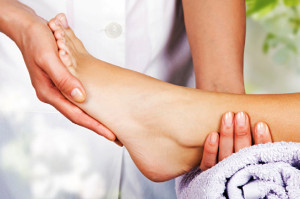 Plantar warts are growths on the feet caused by a virus. The virus can be contracted in moist, warm environments like gym locker rooms or around an indoor pool. If you have cuts on your feet take extra special care to avoid any contact with these surfaces. Make sure to change your socks everyday and never share them with others. Plantar warts are typically not painful at first, but as they grow they can hurt when you walk. If you notice the wart while it is small, there are various types of home remedies that may be effective. However, once the plantar wart grows larger, a podiatrist will be your best option.
Plantar warts are growths on the feet caused by a virus. The virus can be contracted in moist, warm environments like gym locker rooms or around an indoor pool. If you have cuts on your feet take extra special care to avoid any contact with these surfaces. Make sure to change your socks everyday and never share them with others. Plantar warts are typically not painful at first, but as they grow they can hurt when you walk. If you notice the wart while it is small, there are various types of home remedies that may be effective. However, once the plantar wart grows larger, a podiatrist will be your best option.
Plantar warts can be very uncomfortable. If you need your feet checked, contact Dr. Mark Gagnon from Advanced Podiatry. Our doctor will assist you with all of your foot and ankle needs.
About Plantar Warts
Plantar warts are the result of HPV, or human papillomavirus, getting into open wounds on the feet. They are mostly found on the heels or balls of the feet.
While plantar warts are generally harmless, those experiencing excessive pain or those suffering from diabetes or a compromised immune system require immediate medical care. Plantar warts are easily diagnosed, usually through scraping off a bit of rough skin or by getting a biopsy.
Symptoms
- Lesions on the bottom of your feet, usually rough and grainy
- Hard or thick callused spots
- Wart seeds, which are small clotted blood vessels that look like little black spots
- Pain, discomfort, or tenderness of your feet when walking or standing
Treatment
- Freezing
- Electric tool removal
- Laser Treatment
- Topical Creams (prescription only)
- Over-the-counter medications
To help prevent developing plantar warts, avoid walking barefoot over abrasive surfaces that can cause cuts or wounds for HPV to get into. Avoiding direct contact with other warts, as well as not picking or rubbing existing warts, can help prevent the further spread of plantar warts. However, if you think you have developed plantar warts, speak to your podiatrist. He or she can diagnose the warts on your feet and recommend the appropriate treatment options.
If you have any questions please feel free to contact one of our offices located in Crestwood, Orland Park, and Summit, IL . We offer the newest diagnostic and treatment technologies for all your foot and ankle needs.
The Importance of Diabetic Foot Care
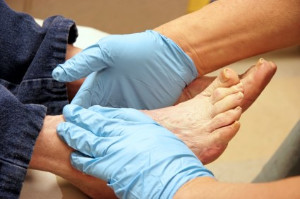 For those who have diabetes, it’s important to remember how vital it is to take proper care of your feet. Diabetes can lead to long-term foot problems if the feet are not constantly monitored and managed. Avoid using temperature-controlled items such as heating pads or electric blankets, as diabetic feet are prone to a loss of feeling, or neuropathy and can be easily burned. Avoid picking at corns, calluses, or ingrown toenails without professional supervision. Always wear shoes and avoid walking barefoot. Do routine checks of your feet, maintain proper hygiene, and do foot exercises to encourage blood circulation. Be sure to watch your diet to maintain healthy blood sugar levels, and visit your podiatrist often for check-ups.
For those who have diabetes, it’s important to remember how vital it is to take proper care of your feet. Diabetes can lead to long-term foot problems if the feet are not constantly monitored and managed. Avoid using temperature-controlled items such as heating pads or electric blankets, as diabetic feet are prone to a loss of feeling, or neuropathy and can be easily burned. Avoid picking at corns, calluses, or ingrown toenails without professional supervision. Always wear shoes and avoid walking barefoot. Do routine checks of your feet, maintain proper hygiene, and do foot exercises to encourage blood circulation. Be sure to watch your diet to maintain healthy blood sugar levels, and visit your podiatrist often for check-ups.
Diabetic foot care is important in preventing foot ailments such as ulcers. If you are suffering from diabetes or have any other concerns about your feet, contact Dr. Mark Gagnon from Advanced Podiatry. Our doctor can provide the care you need to keep you pain-free and on your feet.
Diabetic Foot Care
Diabetes affects millions of people every year. The condition can damage blood vessels in many parts of the body, especially the feet. Because of this, taking care of your feet is essential if you have diabetes, and having a podiatrist help monitor your foot health is highly recommended.
The Importance of Caring for Your Feet
- Routinely inspect your feet for bruises or sores.
- Wear socks that fit your feet comfortably.
- Wear comfortable shoes that provide adequate support.
Patients with diabetes should have their doctor monitor their blood levels, as blood sugar levels play such a huge role in diabetic care. Monitoring these levels on a regular basis is highly advised.
It is always best to inform your healthcare professional of any concerns you may have regarding your feet, especially for diabetic patients. Early treatment and routine foot examinations are keys to maintaining proper health, especially because severe complications can arise if proper treatment is not applied.
If you have any questions please feel free to contact one of our offices located in Crestwood, Orland Park, and Summit, IL . We offer the newest diagnostic and treatment technologies for all your foot and ankle needs.
